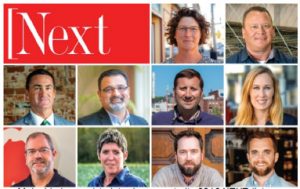
Mainebiz recently selected our own Dr. Khoury as one of the key influencers of Maine’s economy and we couldn’t be prouder.
Unity College alumni may remember engaging in an exercise called “Unlikely Partners” as first-year students. The exercise pairs students with seemingly little in common and sends them off on excursions in nature. The outcome? When we spend time with new people, we gain appreciation for their perspectives. Educators might call this empathy training. We call it Unity.
Problem solvers must be prepared to see issues inclusively, through multiple perspectives, including society, economy, and environment. This sometimes requires meaningful relationships with unusual partners, organizations, and individuals in government, industry, and education.
“We are exploring powerful partnerships because they move the needle, and unlikely partnerships because innovation often comes from unlikely places,” Khoury said.
Educational partnerships
Educational partnerships focused on research — such as a NIMBioS project with the University of Tennessee this year — allow Unity College to leverage physical and intellectual resources beyond our own campus for greater impact.
Dr. Khoury is a “what if” kind of president: “What if we had a student-led, cross-institution, research program that leveraged the resources of top institutions to solve real-world problems?”
Government partnerships
Engaging in policy debates and connecting to global environmental initiatives are two ways government partnerships open doors for Unity students. In April, Khoury moderated a Power Dialog discussion featuring student workshops, a panel discussion with the top energy experts, and an appearance by Maine Gov. Paul R. LePage.
Bringing students face-to-face with officials in 30 states, the nonpartisan event engaged Maine high school students, faculty, and staff in a weeklong discussion about the state’s energy policy.
Khoury said the event aligned with Unity College’s sustainability science curriculum, “where we discuss things like energy policy based on facts and science without prejudice or fear.”
Corporate partnerships
Colleges and governments don’t hold the monopoly on thinking and solutions.
“Businesses have been telling us about their workforce needs, and we’re responding. On the other side, we’re looking to partner with thought leaders and philanthropists to provide us their view of industry best practices,” Khoury said.
“The paradigm that business is the problem and the university is the Ivory Tower providing the solution is outmoded.”





